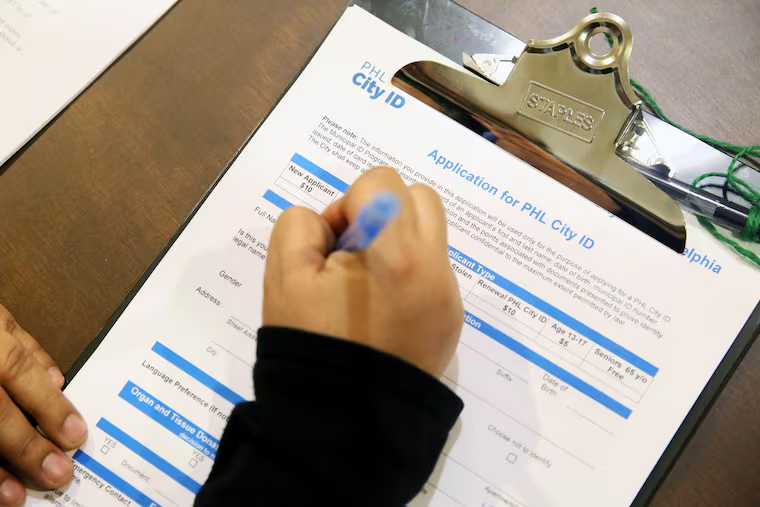With Philly municipal ID demand far exceeding expectations, the city makes adjustments
Philadelphia has issued more than 7,500 municipal IDs in the four and a half months since the program started, on track to far exceed the city’s initial goal of distributing 10,000 cards in the first year.

Residents of Delaware and Montgomery Counties have shown up at Philadelphia’s City Hall seeking the city’s municipal IDs. An Allentown resident wanted to drive 60 miles to get one.
But they were rebuffed: Only city residents are eligible for PHL City IDs, and demand has been brisk — far exceeding expectations.
The city’s goal was to distribute 10,000 cards in the first year of the program, which started in the spring. However, it already has issued more than 7,500 as of this week. City Hall appointments are booked through September, and the city has extended walk-in hours.
Pittsburgh and Erie have asked Philadelphia for guidance as they consider starting their own municipal ID programs.
More than 20 local governments throughout the country offer identification cards that are cheaper to get than state IDs and that can be issued to people who have different types of identifying documents from the ones state governments require.
People who are homeless or transient, living in poverty, newly released from prison, immigrants, and anyone else who faces barriers to getting a state ID can apply for a municipal one. PHL City IDs are available to Philadelphia residents 13 and older.
Pennsylvania has agreed to accept municipal IDs from residents trying to get replacement birth certificates, said Amy Eusebio, director of the municipal ID program.
Municipal IDs cannot be used to vote, travel, or enter federal buildings. They have nothing to do with the REAL ID Act, a federal mandate that state ID cards and driver’s licenses meet heightened security standards.
The Philadelphia program got a more than $130,000 funding boost from City Council to pay for additional cards, which come preprinted with security features, and equipment, such as cameras and signature pads.
“We quickly realized there was a lot of interest in IDs from a lot of communities,” Eusebio said.
>>READ MORE: A couple weeks after Philly started issuing municipal IDs, appointments filled up
Philadelphia has extended its walk-in availability in Room 167 of City Hall from just Wednesdays, to Tuesdays through Thursdays from 9 a.m. to 4 p.m. It has issued IDs at about 20 off-site locations in partnership with churches, libraries, and community centers. Residents of varying ages, gender identities, and immigration statuses throughout the city have gotten cards.
One way Philadelphia residents are using city IDs has been unexpected. Some who have state IDs or passports and worry about losing them — especially people without stable housing — said they plan to keep those documents in a safe place and carry around the municipal ID.
Some people have tried to use the card to open bank accounts, but financial institutions in the city do not accept them. Nicole Kligerman, director of the Pennsylvania Domestic Workers Alliance, said that being able to open bank accounts with the cards would be huge for undocumented immigrants, many of whom don’t use banks because of their status.
If someone has a card turned away, Kligerman said, “that can have a ripple effect if they go back in their community” and share their experience.
In the next month, the city plans to ramp up promotion, which it halted because of the volume of ID applicants, officials said. As part of that effort, the city is working to increase acceptance of the card throughout the city, including at banks and among police officers, some of whom accept the IDs and some don’t.
The municipal ID program also is serving as “a gateway into other city services,” Eusebio said. For example, say a man has been living with family and doesn’t have official proof of address. Program employees tell him to get a checkup at a city health center, from which he can get a form the city accepts as proof of address.
Staff members found out that one man living above a bodega did not have a written lease agreement with his landlord. They encouraged him to get one, which he did and came back for his ID later that week.
“The city ID is a gateway to other opportunities for people for quality of life,” Eusebio said.